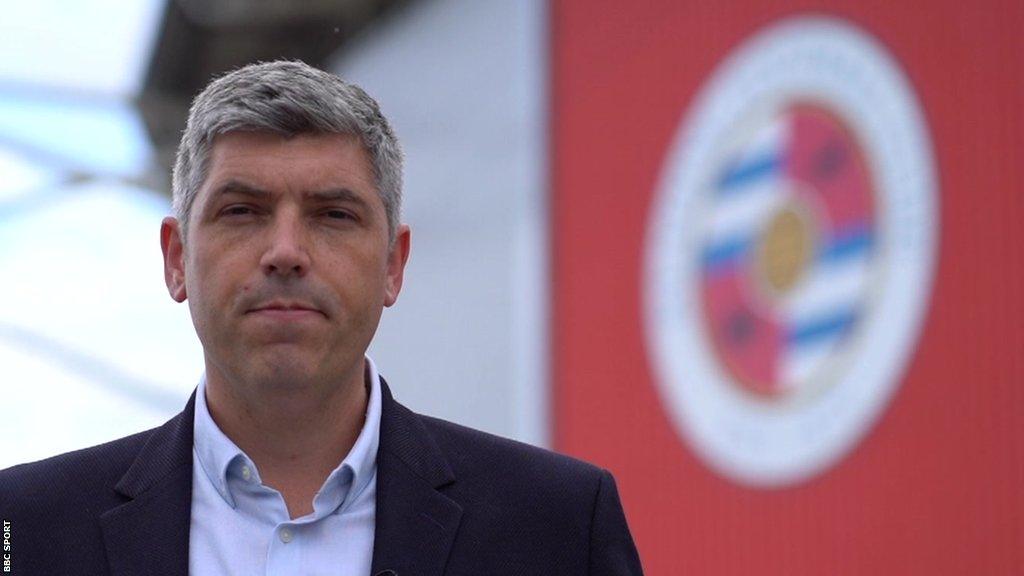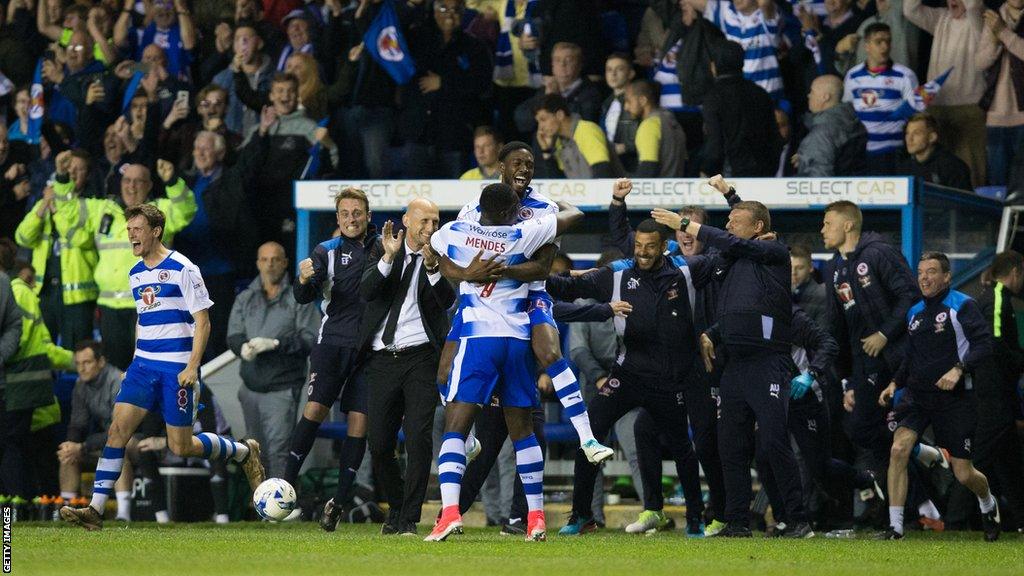Reading FC: The rise and fall of a club and its elusive owner
- Published

BBC South sports editor Lewis Coombes puts Reading FC and its elusive owner under the microscope
It's May 2017 and 22,000 fans are packed into the Madejski Stadium on a cool, overcast spring evening.
Reading have just booked themselves a place in the Championship play-off final with a 2-1 aggregate win over Fulham, thanks to a Yann Kermorgant penalty.
Fans rush on to the pitch to celebrate.
Those who have stayed in the stands wave their flags as cameras flash around the ground to capture the moment under the night sky.
There was a renewed sense of hope and excitement that Reading Football Club was on the way up.
The bright lights of the Premier League were now just one game away.
The next day brought more cause for optimism, as Chinese businessman Dai Yongge and his sister Dai Xiu Li were confirmed as Reading's new owners - their multi-million pound business empire adding the promise of finance to the opportunity that presented itself.
But, just two weeks later, it was an almost identical penalty that painted a very different scene at Wembley.
A shootout defeat by Huddersfield Town was not in the script. The Royals fairytale wasn't meant to end like this.
What's more, few fans realised at the time that the era of Chinese ownership had already peaked.
How a financial gamble turned into a nightmare
Six years on, Reading have been relegated to the third tier of English football for the first time in 21 years, have had points deducted for breaching financial regulations and faced a winding-up petition over unpaid taxes.
Such is the strength of feeling among the same supporters that cheered their side on at Wembley, a pressure group called 'Sell Before We Dai' is now calling for a change in ownership.
I've been on a journey to explore why things have gone so wrong and how a financial gamble on reaching the Premier League has turned into a League One nightmare.
It's taken me on a tour of Chinese governance, underground shopping malls, the Belgian second division, the Hong Kong Stock Exchange and a millionaire's mansion.
I've spoken to a former owner, professors, BBC colleagues in Hong Kong, trawled through stacks of documents and most importantly listened to supporters about why they feel so disconnected with the club they love.
Dreams and ambitions

Reading players and coaching staff celebrate at the final whistle of their Championship play-off semi-final second-leg win over Fulham in 2017
"Reading FC is like family to me," fan Helen told me when I met her and some others outside the Select Car Leasing Stadium one afternoon.
"The team was there to support me when I lost both of my parents, it is important to me, so I feel really sad by the current situation with the owners."
To understand the concerns of supporters like Helen it is important to understand Reading's recent past.
Rewind to 1990 when Unchained Melody by the Righteous Brothers dominated the music charts and Home Alone smashed box office records at the cinema.
With the club on the brink of receivership, British entrepreneur Sir John Madejski used his fortune, amassed through a magazine publishing business, to help turn over a new page for the Royals.
During his 22 years of ownership the club moved to a top-end new stadium and amassed a record 106 points to clinch the Championship title and gain promotion to the top tier for the first time in 135 years.
Sir John dared to dream and delivered on his ambitions.
But what would follow that high was a period of instability.
Penalties and punishments

Mr Dai and his sister Dai Xiu Li took over Reading FC in 2017
Reading were yo-yoing between the top two tiers of English football and it became clear that to sustain their position in the top flight, deeper pockets would be needed.
A revolving door of owners started to crack away at the once solid foundations beneath the club.
When the current owner Dai Yongge - a Chinese businessman - and his sister Dai Xiu Li entered the picture and bought a 75% stake in the Royals in 2017, they became the club's fourth group of owners in five years.
You could say under their ownership it's mostly been a partnership of penalties and punishments, in pursuit of promotion and prizes.
Former chairman Madejski is well liked in the town and widely respected for overseeing the most successful spell in the team's history.
So, naturally, I got in touch to get his take on what was happening with the club he'd personally invested so much time and money in.
"I have total sympathy with the staff and total sympathy with the fans," Madejski said.
"I feel sad that we're in the situation but Mr Dai has actually put well over £200m into the club - it's an absolute skyrocketing fortune on the pitch.
"It hasn't been a success and I think he's had very bad advice because quite frankly for the investment he's put in, he's seen scant return."
BBC South sports editor Lewis Coombes chats to former Reading chairman Sir John Madejski
With numerous failed attempts to make contact with Dai Yongge, I called upon the expertise of the BBC's Hong Kong business unit to help build a better picture of the elusive Chinese tycoon.
Numerous email exchanges and a long-distance call established the background to Dai's business empire that started with turning air-raid shelters into underground shopping malls, and now focusses on agricultural markets.
Further digging uncovered news that the trading of shares in his parent company - the China Dili Group - had been suspended on the Hong Kong Stock Exchange since October 2022 as an independent investigator looks into concerns about its financial reporting, and the integrity of the company's managers.
It also transpired that Dai Yongge and Dai Xiu Li had each previously owned two other football clubs, that had both been dissolved in the past three years.
Both Beijing Renhe in China and Belgian side KSV Roeselare had folded following relegation and financial difficulties.
It was time to look deeper into Reading's financial accounts.
Explained in 90 seconds: How the Dais got interested in football with BBC Chinese Hong Kong reporter Zhijie Shao
I expected grim reading, based on the club's breach of EFL Financial Fair Play rules, but the information printed on those pages showed more than I had realised.
The past five years of accounts reported pre-tax losses of £146m, which far exceeded the EFL limit of a £13m annual pre-tax loss.
At its height in 2021, the club were spending 234% of its revenue on player wages.
Talented players were allowed to leave for relatively low fees because of poor contract management and the lack of release clauses.
The added financial burden of the pandemic only exasperated an already-failing business plan which was simply unsustainable, and resulted in a transfer embargo for nearly two years.
Reading aren't alone in being a football club that's heavily reliant on an owner to provide cash injections to continue operating.
The exact levels that Dai Yongge has invested is unknown but it is believed to be amongst the most by any individual in the club's history.
But what happens when that cash becomes harder to get hold of?
Problems, politics and payments out of China
The most serious red flag for Reading was when HMRC issued a winding-up petition over unpaid taxes at the end of June.
This came shortly after news that the club had been charged by the EFL for failing to pay their players on three separate occasions during the 2022-23 Championship season.
How does a multi-millionaire fail to pay his bills?
Professor Simon Chadwick, an expert in sport and geopolitical economy, told me how the changing political landscape in China was having an impact on getting money out of the country.
"Economic conditions have changed [since Dai's takeover of Reading], the political mood in China has changed, the appetite for football has certainly changed shape.
"The Chinese government started to kick back against 'capital flight' because essentially what was happening is football club investors, amongst others, were borrowing money domestically and then investing that money, very often in unprofitable or unproductive assets, overseas which puts strain on the Chinese financial system.
"So the shutters [on Chinese money leaving China] started to come down in 2017-18 and it became very difficult to move money around."
'Unmitigated disaster'
Explained in 30 seconds: Reading fans tell BBC South Sports Editor Lewis Coombes why they want a change of ownership
It's been clear during this journey that everyone connected to Reading is being hurt by the recent turn of events.
None more so than the fans.
The people that have followed their club through good times and bad, up and down the country, providing the reassuring constant during times of ownership change.
They care.
It spoke volumes that many came out in the pouring rain on a midweek afternoon to share their worries with me about the future direction of their club - they're desperate.
The pressure group, named 'Sell Before We Dai', say they have little faith in owner Dai Yongge and CEO Dayong Pang.
"Despite his best intentions Mr Dai's stewardship has been an unmitigated disaster," said spokesperson Nick Houlton.
"We are now calling for Mr Dai to sell the club at the earliest opportunity."
With the League One season now less than two weeks away, recently appointed head coach Ruben Selles and director of football Mark Bowen are working tirelessly to rebuild a squad using limited resources.
The BBC has approached Reading on numerous occasions, but so far the owners have declined to comment.
We wait to see if their financial woes will continue to impact them and the community that supports them.
Only time will tell if Reading continue their Royal descent.

